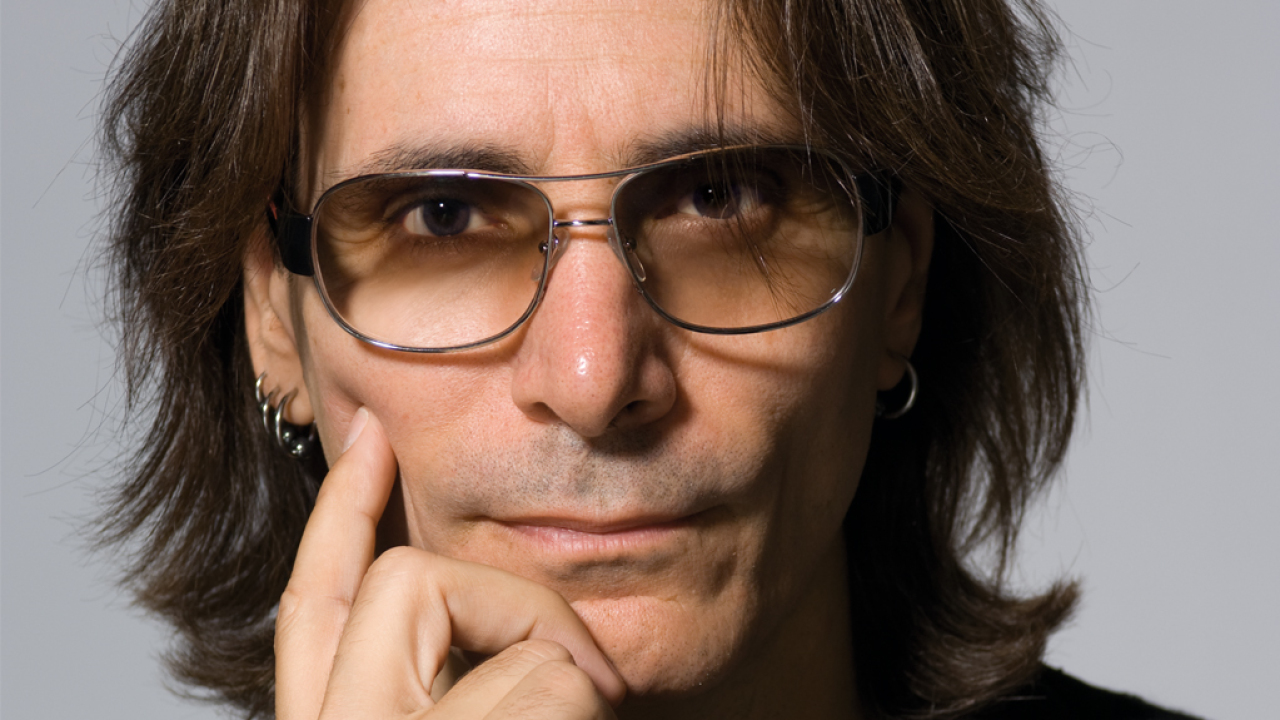Born in Carle Place, New York on June 6, 1960, Vai is one of the most gifted musicians of his generation. He has worked with such diverse artists as Frank Zappa, John Lydon and Whitesnake, and has recorded a series of inventive solo albums. He is also an expert beekeeper, and is currently studying quantum physics. “The world is full of fascinating things,” he says. “But the guitar is my obsession.”
At what age did that obsession begin?
The first time I saw a guitar, at the age of five. It was such a beautiful thing, and I knew immediately the infinite nature of its possibilities.
And in that moment your whole life was preordained?
I never gave it any thought. As far back as I can remember, my life was always about music. There was never a choice involved.
If Hendrix is the best guitar player that ever lived, who’s number two?
The word ‘best’ is a misnomer. I prefer ‘favourite’. Probably the most important guitar player in my life – apart from Joe Satriani, who was my teacher when I was a kid – was Jimmy Page. I don’t see Hendrix or Page as number one or two, but certainly Page had a tremendous impact on me.
Are you a perfectionist?
Not always. On my new live record [Stillness In Motion: Vai Live In LA] I wanted to present the whole show pretty much as is, but I did some tweaking if something was terribly out of tune.
Steve Vai out of tune? Really?
Ha ha. This is a perplexing phenomenon, but yes, it’s true. Sometimes I really attack things with abandon, I throw caution to the wind. There’s an edge of uncontrollability. And sometimes a note that’s out of tune can be the right note for that moment.
You worked for Frank Zappa and David Lee Roth – very different kinds of artists. Was there a common denominator?
Their outlooks and demeanours were pretty contrasting. Where they were similar was in their ability to visualise and then execute. They were both very powerful creators, but in different realms. Frank explored technology and composition, and Dave was more about performance.
- Roy Harper to reissue 3 albums and announces tour
- Bruce Springsteen to release soundtrack for autobiography
- Classic Rock Quiz: General Knowledge II
- Iron Maiden’s Wacken set to be streamed live globally
What was the worst review you ever had?
There was a period in the nineties when the focus shifted from eighties-type shredders to the grunge scene. There wasn’t a magazine in the world that didn’t use me as a poster boy for everything wrong about playing guitar. It was painful.
You mean humbling?
Yes. When you’re on the cover of every magazine and you’re winning all the guitarist polls and you’re selling millions of records and everybody is telling you you’re great, it’s almost impossible – or at least it was for me – to not buy into it. But it’s never sustained – public opinions change, trends come and go. But if you stick to what you’re doing, for the joy of it, it always comes back around.
Can a bad review still hurt you?
Oh yeah. You’ll spend a year working on something, and someone will post on your site: “This is the worst shit I’ve ever heard.”
What’s the appeal of bee-keeping?
It’s an opportunity to get away from everything – because nobody’s going to come near me when I’m with the bees. And you’re focused on nature – focused on something that is outside of anything else that you do. Bees are fascinating creatures.
You must have been stung a few times.
Actually I haven’t. Honeybees don’t naturally sting. The temperament of a colony is based on the temperament of the queen, and I like to get Italian queens because they are known for their gentle nature. And they make so much honey it’s unbelievable. They even make tomato sauce occasionally [laughs]. Sorry, a beekeeper’s joke.
What in your life are you most proud of?
I don’t know if pride is what I feel – it’s more like gratitude – but whenever I create a piece of music that moves me in a deep kind of way, I feel gratitude that it was able to come through me.
Do you believe in God?
You’ll have to be more specific on what your concept of God is.
What is your concept of God?
I would use different terminology. Like ‘infinite potentiality’, or ‘presence’, or ‘pure consciousness’. But to talk about God is difficult because there is a lot of dogma attached to the word.
What is the meaning of life?
To find joy. To find peace. That’s what everybody wants more than anything else. That’s what I want. And when you’re searching for it in the world, you will be let down all of the time. You might find a little joy and peace occasionally, but true, deep, everlasting peace is already in you – it’s just being obscured by your ego.
And what will be written on your tombstone?
I don’t plan on having a tombstone. But I did think of an epitaph once: ‘Under it all, there’s so much more.’
This article originally appeared in issue 210 of Classic Rock

